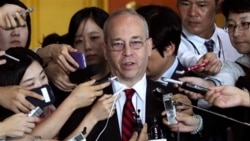“The rebalance to Asia is a major element of U.S. foreign policy,” U.S. Assistant Secretary for East Asian and Pacific Affairs Daniel Russel said recently at a Mekong Health Event in Washington, DC.
“[The United States has] a diversity of interests that are reflected in our wide-ranging engagement in the region – well beyond our important role in guaranteeing regional security and stability.”
The U.S. is involved in promoting trade and economic growth, expanding education, addressing energy needs and managing resources, and building institutions. It is supporting democracy and human rights by nurturing civil society, promoting good governance, and defending the rule of law. It is also dealing with threats from communicable diseases and preventing pandemics by supporting public health programs.
“One of the drivers of growth, connectivity and development ... is the Association of South East Asian Nations,” Assistant Secretary Russel said. “ASEAN’s top goal [is] ... to build an economic community [by] bridging the development gap ... between the richer states of maritime Southeast Asia and the Mekong sub-region.”
“The United States is among the largest contributors ... to this [Mekong] sub-region, providing two-thirds of our assistance to health, the environment, and education,” Assistant Secretary Russel continued. “Lower Mekong Initiative [is] a significant new model. ... We are trying ... to work with governments to boost their capacity to tackle specific development challenges.”
Thailand, Laos, Cambodia, Vietnam, and Myanmar are engaged in the Lower Mekong Initiative, and each country co-chairs one of the six designated pillars: agriculture and food security, connectivity, education, energy security, environment and water, and health.
The Friends of the Lower Mekong has been created to bring in Japan, South Korea, the European Union, Australia, New Zealand, the Asian Development Bank and the World Bank to give a framework for collaboration and coordination with other donors and organizations.
“Improving the health of millions of people in Southeast Asia ... is an important objective of the rebalance toward Asia,” Assistant Secretary Russel said in conclusion. “U.S.-backed health programs in East Asia are building a strong foundation to expand future global health capabilities in the Mekong River nations.”
“[The United States has] a diversity of interests that are reflected in our wide-ranging engagement in the region – well beyond our important role in guaranteeing regional security and stability.”
The U.S. is involved in promoting trade and economic growth, expanding education, addressing energy needs and managing resources, and building institutions. It is supporting democracy and human rights by nurturing civil society, promoting good governance, and defending the rule of law. It is also dealing with threats from communicable diseases and preventing pandemics by supporting public health programs.
“One of the drivers of growth, connectivity and development ... is the Association of South East Asian Nations,” Assistant Secretary Russel said. “ASEAN’s top goal [is] ... to build an economic community [by] bridging the development gap ... between the richer states of maritime Southeast Asia and the Mekong sub-region.”
“The United States is among the largest contributors ... to this [Mekong] sub-region, providing two-thirds of our assistance to health, the environment, and education,” Assistant Secretary Russel continued. “Lower Mekong Initiative [is] a significant new model. ... We are trying ... to work with governments to boost their capacity to tackle specific development challenges.”
Thailand, Laos, Cambodia, Vietnam, and Myanmar are engaged in the Lower Mekong Initiative, and each country co-chairs one of the six designated pillars: agriculture and food security, connectivity, education, energy security, environment and water, and health.
The Friends of the Lower Mekong has been created to bring in Japan, South Korea, the European Union, Australia, New Zealand, the Asian Development Bank and the World Bank to give a framework for collaboration and coordination with other donors and organizations.
“Improving the health of millions of people in Southeast Asia ... is an important objective of the rebalance toward Asia,” Assistant Secretary Russel said in conclusion. “U.S.-backed health programs in East Asia are building a strong foundation to expand future global health capabilities in the Mekong River nations.”

















